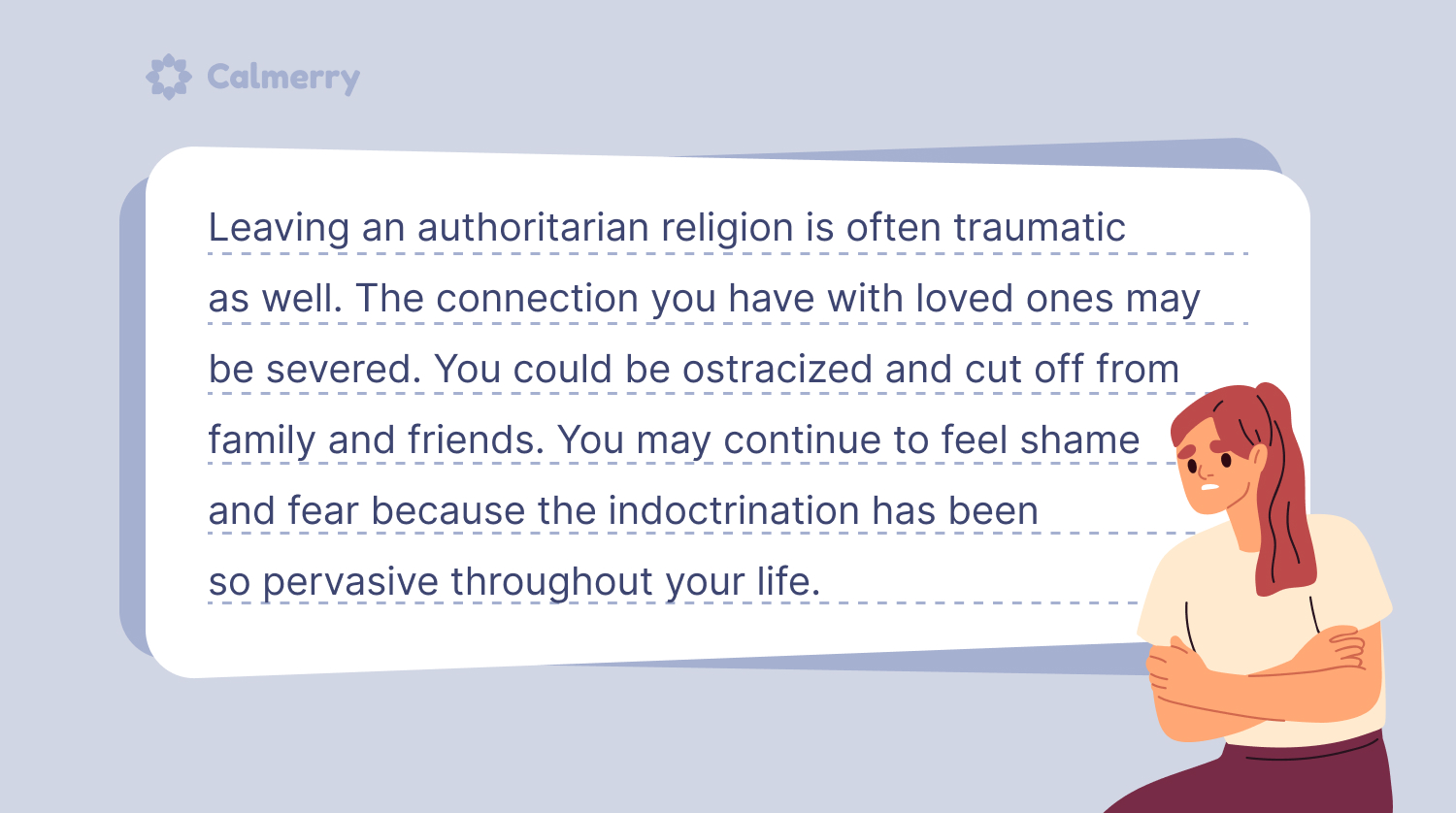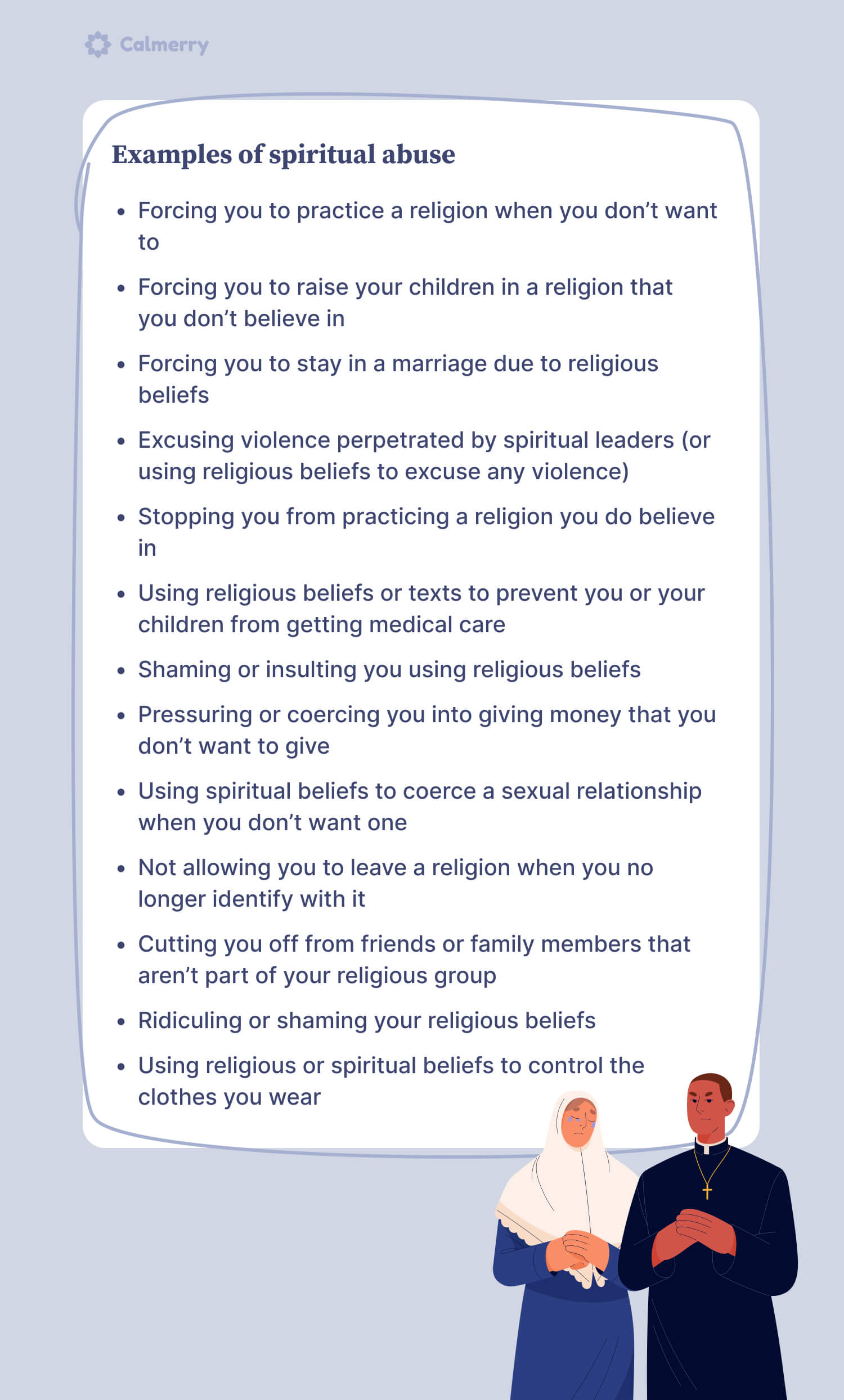What Is Religious Trauma, and What Are the Ways to Heal?

In this article
Trauma is the psychological term that’s used to describe the psychological response to any event that is terrifying or life-threatening.
Some common examples of traumatic events include physical, sexual, or emotional abuse, natural disasters, and being the victim of or a witness to violence. People experiencing trauma may constantly feel on edge or frightened, have nightmares or flashbacks about the event, and more.
Traumatic experiences are much more common than you may realize – reports show that up to 70% of people will go through at least one trauma in their lifetime. Sadly, trauma can happen even in places that should be safe – like within spiritual communities.
Religious trauma is what happens when a traumatic event, like abuse, happens in connection to religious beliefs, settings, or organizations. Often, it’s not just one singular event that is traumatic – rather, it’s the indoctrination and shame that’s associated with being part of (and, in many cases, leaving) the religion itself.
If religion or a specific church has caused you to feel shame or fear, then you may be facing religious trauma. Having these feelings after any traumatic event is normal, but it’s important to know that there are ways to heal.
What is religious trauma syndrome?
Religious trauma has happened within spiritual institutions for generations, and mental health professionals have long recognized the psychological and emotional damage that religious indoctrination, and other types of spiritual abuse, can cause.
But we’ve only recently put a name to this type of trauma. The term “religious trauma syndrome” was coined in 2011 by a psychologist named Marlene Winell. In her paper, she described how important it is to put a name to the experience that so many people share.
Religious trauma syndrome is not yet included in the Diagnostic Statistical Manual (DSM) and is not an official clinical diagnosis.
How religious trauma syndrome occurs
Religious trauma syndrome (RTS) specifically describes people who are leaving or have left a dogmatic or authoritarian religion.
There are two core traumas that occur as part of RTS: first, the religious indoctrination itself can be traumatic and cause a lot of shame. But for most people, leaving the religion – however much they may have desired to leave – is also traumatic.
For example, someone belonging to a dogmatic church may be traumatized by the church itself. Church leaders may have tried to indoctrinate this person throughout their life – family members may have also participated. The person may have been made to feel shame and guilt for their identity or choices. For example, a gay man may have been repeatedly told that their sexuality was a “sin.”
This, in itself, is traumatic. But leaving an authoritarian religion is often traumatic as well. For example, the connection you have with loved ones may be severed. You could be ostracized and cut off from family and friends. You may continue to feel shame and fear because the indoctrination has been so pervasive throughout your life.

Signs of religious trauma
RTS shares many similarities with Complex PTSD (C-PTSD), which is a disorder that can develop when someone has been abused or traumatized by someone who is supposed to be a safe figure, like a parent. This can look differently from PTSD, which happens after other traumatic events (like a natural disaster).
Some recognized symptoms of RTS include:
- Self-loathing and poor self-esteem
- Difficulty making decisions or trusting your own judgment
- Hypervigilance or feeling like someone is always watching you
- Chronic shame
- Identity confusion
- Depression and anxiety
- Grief
- Dissociation or feeling disconnected from yourself
- Developmental immaturity due to growing up within a religious environment (for example, being socially or sexually “behind” compared to peers)
- Sleep and eating disorders
- Substance abuse
What is spiritual abuse?
Spiritual abuse is related to religious trauma, and could be considered one type of religious trauma.
When we talk about spiritual abuse, we are referring to any instance in which someone has used religious beliefs to manipulate, scare, or harm you. Often, spiritual abuse is perpetrated by spiritual leaders to their followers – for example, a “guru” could use spiritual beliefs to pressure a follower into having a sexual relationship with him.
But spiritual abuse can happen on any level of a religious organization – and in any type of religion.
Some examples of spiritual abuse include:
- Forcing you to practice a religion when you don’t want to
- Forcing you to raise your children in a religion that you don’t believe in
- Forcing you to stay in a marriage due to religious beliefs
- Excusing violence perpetrated by spiritual leaders (or using religious beliefs to excuse any violence)
- Stopping you from practicing a religion you do believe in
- Using religious beliefs or texts to prevent you or your children from getting medical care
- Shaming or insulting you using religious beliefs
- Pressuring or coercing you into giving money that you don’t want to give
- Using spiritual beliefs to coerce a sexual relationship when you don’t want one
- Not allowing you to leave a religion when you no longer identify with it
- Cutting you off from friends or family members that aren’t part of your religious group
- Ridiculing or shaming your religious beliefs
- Using religious or spiritual beliefs to control the clothes you wear
Although spiritual abuse may not always cause physical harm, it is a form of psychological abuse that should be taken seriously.
If you are the victim of spiritual abuse, you can call the National Domestic Violence Hotline at 1-800-799-SAFE for help and resources.

How to heal from religious trauma
Luckily, there are ways to heal from religious trauma. Although you may never forget what happened, it doesn’t have to affect you in the same way forever.
Recognize it
First of all, it’s important to recognize what religious trauma is and when it’s happening to you. When you have gone through religious trauma, the indoctrination may be so strong that it makes you feel ashamed or “wrong” about what you’re feeling. You may think that the trauma was your fault. You may even be made to believe that your experience wasn’t traumatic at all.
Reading about religious trauma syndrome may help you create space to allow yourself to acknowledge the fact that what you experienced was, in fact, traumatic. Without recognizing it and naming it, you cannot heal.
Reconnect with yourself
Religion is often a big part of identity. If you were part of an authoritarian religious group, then being a member of this group may have been a strong part of your identity as well. When you leave a group like this, it can feel like you’ve lost part of yourself. You may feel disoriented and disconnected. You may wonder, “Who am I now?”
Many people find that it’s important to reconnect with themselves during this time of healing. Who are you outside of how your religion has defined you? Who do you want to be? What are the values that you most identify with? What are your true spiritual beliefs?
Reconnecting and rebuilding an identity can be a powerful way to heal from religious trauma.
Build a community
Many people lose loved ones when they leave a religious organization. They may be cut off or ostracized from close friends and family members. This can cause a great amount of grief and loneliness.
When healing from any type of trauma, connecting with a strong social support system is important. But if you’ve been cut off from the people you’ve always known, then this can prove to be more of a challenge.
Start building a new community. This could be centered around a new religious organization – one that’s not abusive – or something else altogether. You may also want to connect with a community of people who understand what religious trauma is and what it feels like.
Consider therapy
Lastly, many people benefit from mental health therapy when healing from religious trauma. Going to therapy doesn’t necessarily mean that you live with a mental illness. A therapist can provide you with a safe and confidential space in which you can explore the trauma and let go of its effects on you. A therapist can also help you recover from associated mental health conditions like depression.
With Calmerry, you can talk to a therapist from the comfort of your own home.
online therapy
live video session


